Bussel Surname Ancestry ResultsOur indexes 1000-1999 include entries for the spelling 'bussel'. In the period you have requested, we have the following 34 records (displaying 11 to 20): Single Surname Subscription | | | Buying all 34 results of this search individually would cost £176.00. But you can have free access to all 34 records for a year, to view, to save and print, for £100. Save £76.00. More... |
These sample scans are from the original record. You will get scans of the full pages or articles where the surname you searched for has been found. Your web browser may prevent the sample windows from opening; in this case please change your browser settings to allow pop-up windows from this site. Worcestershire Inhabitants
(1280)
The Worcestershire Lay Subsidy roll of about 1280 lists lay inhabitants of each township of the shire and of each ward of the city of Worcester, with the amount of tax payable by each. Latin.BUSSEL. Cost: £4.00.  | Sample scan, click to enlarge
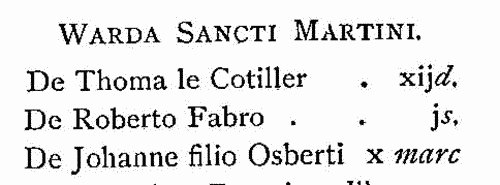
| Lancashire Assizes
(1202-1285)
All the surviving records of the assizes held by the royal justices in eyre (itinerant) in Lancashire during this period were extracted by colonel John Parker and published by the Lancashire and Cheshire Record Society from 1904. The justices not only tried all civil actions outstanding on their advent, pleas of the crown and common pleas, but also interrogated the juries of each wapentake and borough as to the Capitula Itineries, the Articles of the Eyre, inquiring into the king's proprietary rights, escheats, wardships, and questions of maladministration. Only a dozen complete rolls survive for this period; but Appendix I (pp. 218-253) gathers together from the Patent Rolls of the reign of Henry III (1216-1272) a schedule of Lancashire assizes for which justices were assigned; and Appendix II (306-342) adds the fines and amercements before the justices during that reign, as recorded on the Pipe Rolls.BUSSEL. Cost: £4.00.  | Sample scan, click to enlarge

| Lancashire Feet of Fines
(1196-1307)
Pedes Finium - law suits, or pretended suits, putting on record the ownership of land in Lancashire. These abstracts were prepared by William Farrer for the Lancashire and Cheshire Record Society and published in 1899, under the title 'Final Concords of the County of Lancaster, from the Original Chirographs, or Feet of Fines, preserved amongst the Palatinate of Lancaster Records in the Public Record Office'. They cover the period from the 7th year of king Richard I to the end of the reign of king Edward I, with a couple of fragmentary survivors from earlier (1187 and 1194).BUSSEL. Cost: £4.00.  | Sample scan, click to enlarge
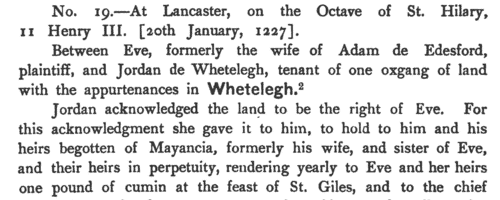
| Charter Rolls
(1050-1326)
This abstract of the surviving charter rolls for 1300 to 1326, in the reigns of kings Edward I and II, was prepared by C. G. Crump and A. E. Stamp and published in 1908. The charter rolls not only recorded royal grants of lands, liberties and offices, but also enabled landowners to have their existing charters, their deeds of title, registered by the process of inspeximus and confirmation. After the Statute of Mortmain of 1279, this was of particular importance to religious houses, now greatly restricted in their ability to receive new donations of land, and anxious to prove title to their ancient property. Consequently, many charters of great age were copied onto the charter rolls.BUSSEL. Cost: £4.00.  | Sample scan, click to enlarge

| Inhabitants of Cheshire and North Wales
(1320-1329)
The county of Cheshire had palatine status, being in some measure independent of the rest of England: moreover, from the Statute of Wales of 1284, after king Edward I's subjugation of North Wales, until the union of England and Wales in 1536 to 1543, much of the administration of North Wales (county Flint in particular) was directed from Chester. When the Chester Recognizance Rolls were moved from Chester to the Public Record Office, they were placed among the Welsh Records. These rolls, so called because they do include recognizances (of debts &c.) among their contents, are in fact the Chancery Rolls of the palatinate, containing enrolments of charters, letters patent, commissions and other documents issued under the seal of the palatinate. Deeds and other evidences of a private nature were also enrolled on them. A calendar of the Recognizance Rolls from their commencement to the end of the reign of Henry IV was prepared by Peter Turner and included in the 36th Annual Report of the Deputy Keeper of the Public Records in 1875. We have now indexed this, dividing the enrolments into decades. This is the period from the 13th year of the reign of king Edward II to the 3rd year of king Edward III.BUSSEL. Cost: £6.00.  | Sample scan, click to enlarge
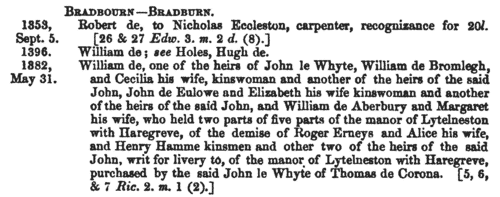
| Lancashire landowners and their tenants
(1310-1333)
This compilation of abstracts of Lancashire inquisitions, extents (surveys) and feudal aids (taxes) was prepared for the Lancashire and Cheshire Record Society and printed in 1907, from originals in the national archives of the Public Record Office. Almost all the material has been translated from the original abbreviated Latin: where surnames have been Anglicized, the original is shown in italics, as with the word 'faber' in the sample scan. BUSSEL. Cost: £6.00.  | Sample scan, click to enlarge
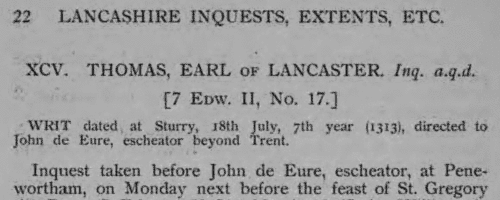
| Clergy, the religious and the faithful in Britain and Ireland
(1342-1362)
These are abstracts of the entries relating to Great Britain and Ireland from the Regesta of popes Clement VI and Innocent VI, from the period when the papal court was resident at Avignon. Many of these entries relate to clerical appointments and disputes, but there are also indults to devout laymen and women for portable altars, remission of sins, &c. This source is particularly valuable for Ireland, for which many of the key government records of this period are lost. Clement VI was consecrated and crowned 19 May 1342 (the day from which his pontificate is dated); Innocent VI was crowned 18 December 1352 and died 12 September 1362. The extracts were made by W. H. Bliss and C. Johnson from Regesta cxxxvii to ccxliv, and published in 1897. The registers are almost complete for these two pontificates. At his accession, Clement VI promised to grant benefices to all poor clerks who should come to Avignon and claim them within two months of his coronation. As many as 100,000 are said to have come, and the register for the first year of his pontificate runs to twelve volumes.BUSSEL. Cost: £4.00.  | Sample scan, click to enlarge

| Norfolk Feet of Fines
(1307-1485)
Pedes Finium - law suits, or pretended suits, putting on record the ownership of land in Norfolk. These abstracts were prepared by Walter Rye.BUSSEL. Cost: £4.00.  | Sample scan, click to enlarge

| Landowners and tenants in Dorset
(1345-1485)
Inquisitions ad quod damnum were held by the appropriate sheriff or escheator (or other officer in whose bailiwick the matter in question might lie) to investigate cases in which the royal or public interest might be damaged by proposed alienation or settlement of land (especially alienation to religious uses, into mortmain). The key findings from these inquisitions were as to the tenure of the land and the service due from it; its yearly value; the lands remaining to the grantor, and whether they sufficed to discharge all duties and customs due from him; and whether he can still be put upon juries, assizes and recognitions, so that the country be not burdened by his withdrawal from them. Generally speaking, this process had the makings of a system of licensing such alienations, and raising money in proportion to the valuations. Equally, there are many items that deal with subjects such as the closing of public roads, the felling or inclosing of woods, or the proposed grant of liberties or immunities. A calendar of these inquisitions from the 19th year of the reign of king Edward III to the 2nd year of Richard III was prepared by the Public Record Office and published in 1906. We have now indexed this calendar by surname and county. Most of the individuals appearing in the calendar are either pious individuals seeking to make grants to religious bodies for the sake of their souls; or landowners securing the disposition and settling of their real estate. But some other names do appear - tenants, trustees, chaplains and clerks.BUSSEL. Cost: £6.00.  | Sample scan, click to enlarge
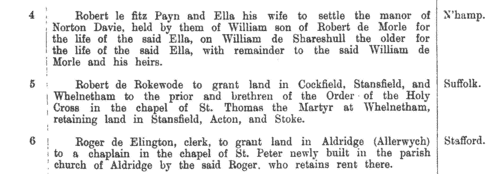
| Early records of Wells cathedral, in Somerset
(1001-1500)
Three early registers of the dean and chapter of Wells - the Liber Albus I (White Book; R I), Liber Albus II (R III), and Liber Ruber (Red Book; R II, section i) - were edited by W. H. B. Bird for the Historical Manuscripts Commissioners and published in 1907. These three books comprise, with some repetition, a cartulary of possessions of the cathedral, with grants of land dating back as early as the 8th century, well before the development of hereditary surnames in England; acts of the dean and chapter; and surveys of their estates, mostly in Somerset.BUSSEL. Cost: £6.00.  | Sample scan, click to enlarge

|
Research your ancestry, family history, genealogy and one-name study by direct access to original records and archives indexed by surname.
|












